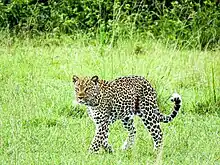engo
Galician
Etymology
Attested since the 15th century. From local Vulgar Latin *educus, probably from Hispano-Celtic *ĕdŭcos (compare Gaulish *oducos, Latin ebulum and English elder). Cognate of Portuguese engos and of Spanish yezgo (“dwarf elder”).
Pronunciation
- IPA(key): /ˈɛŋɡo̝/
Noun
engo m (plural engos)
- dwarf elder (Sambucus ebulus)
- Synonym: sabugueiriño
- 1409, J. L. Pensado Tomé, editor, Tratado de Albeitaria, Santiago de Compostela: Centro Ramón Piñeiro, page 143:
- filla o çumo dos allos et das cebollas et do engu, que semella sebugo
- (please add an English translation of this quotation)
References
- “engu” in Xavier Varela Barreiro & Xavier Gómez Guinovart: Corpus Xelmírez - Corpus lingüístico da Galicia medieval. SLI / Grupo TALG / ILG, 2006–2018.
- “engo” in Dicionario de Dicionarios da lingua galega, SLI - ILGA 2006–2013.
- Joan Coromines, José A. Pascual (1983–1991) “yezgo”, in Diccionario crítico etimológico castellano e hispánico (in Spanish), Madrid: Gredos
Tooro

engo
Etymology
Inherited from Proto-Bantu *ngò (“leopard”). Cognate with Rwanda-Rundi ingwe, Lingala nkɔi and Zulu íngwe.
Pronunciation
- IPA(key): /éːnɡo/
- Rhymes: -éːnɡo
- Hyphenation: e‧ngo
Noun
engo class 9 (plural engo class 10, augmentless ngo, plural augmentless ngo)
- leopard, member of the species Panthera pardus
- Hyponym: entale (“lion”)
References
- Kaji, Shigeki (2007) A Rutooro Vocabulary, Tokyo: Research Institute for Languages and Cultures of Asia and Africa (ILCAA), →ISBN, page 31
- Rubongoya, L. T. (2013) Katondogorozi y'Orunyoro-Rutooro n'Orungereza [Runyoro–Rutooro-English and English-Runyoro–Rutooro dictionary], Kampala: Modrug Publishers, →ISBN, page 280
- Entry 1408 at Bantu Lexical Reconstructions 3
This article is issued from Wiktionary. The text is licensed under Creative Commons - Attribution - Sharealike. Additional terms may apply for the media files.